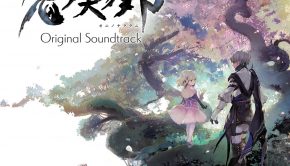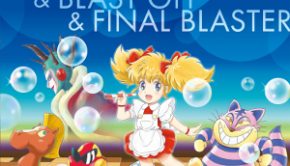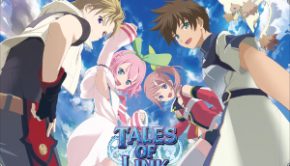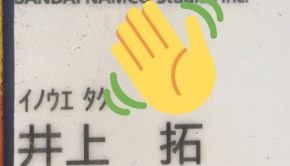Tales of Phantasia 20th Anniversary Sound Box
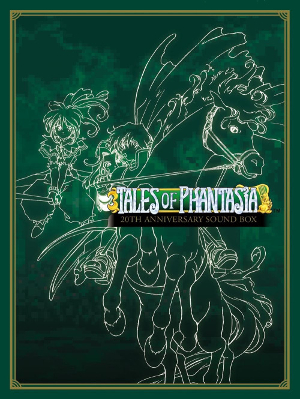 |
Album Title: Tales of Phantasia 20th Anniversary Sound Box |
| Record Label: City Connection |
|
| Catalog No.: CDGM-10035 (Regular Edition); CDGM-10036 (Limited Edition) |
|
| Release Date: August 7, 2015 |
|
| Purchase: Buy at Official Site |
Overview
Tales of the Phantasia is the first entry in the long-running Tales RPG franchise. Developed by Wolfteam and published by Namco for the SNES in 1995, the game remained a Japan exclusive until it was finally localised eight years later. It nevertheless won the hearts of many fans with its traditional but heartwarming storyline, innovative battle system, and technically advanced graphics and sound. The soundtrack was written by progressive rock composer Motoi Sakuraba in collaboration with pop music producer Shinji Tamura and bit contributor Ryota Furuya. While the Tales series is often criticised for producing derivative, uneven scores, their soundtrack for this title proved as polished as it was ambitious. The game’s audio absolutely pushed the SNES’ sound driver to the limits and even managed the seemingly-impossible feat of featuring a full theme song. Together with Sakuraba’s similarly impressive soundtrack for Star Ocean, this soundtrack rivalled the likes of Nobuo Uematsu’s Final Fantasy VI, Yasunori Mitsuda’s Chrono Trigger, and Koichi Sugiyama’s Dragon Quest VI as the most musically and technologically accomplished SNES RPG soundtrack to ever be released.
The game was remade on several occasions, most notably for PlayStation in 1998 and Game Boy Advance in 2003, with the soundtracks completely resampled. Until now, only the PlayStation version of the soundtrack was released on an album and, despite its title (Tales of Phantasia Original Soundtrack Complete Version), the album was still somewhat incomplete. The groundbreaking SNES version and localised GBA version remained unavailable to fans. With 2015’s Tales of Phantasia 20th Anniversary Sound Box, City Connection finally corrected this and gave the game’s music the commemoration it deserved. It features the SNES, PSX, and GBA versions of the score in all-new digital recordings in a lavishly-presented, nine-disc box. While the box sounds wonderful, is it really worth a hundred dollar pricetag?
Body
The first three discs feature the complete soundtrack for the SNES version of the game. Right from the opening theme song, “Yume Wa Owaranai” (lit: “The Dream Will Not End”), it’s clear that the soundtrack is a progressive one. By using a high-capacity game cartridge, the developers were able to incorporate a fully-fledged pop song, complete with Japanese lyrics sung by Yukari Yoshida. Given the enormous restrictions of the console, the vocal parts were heavily downsampled and the instrumentals are sequenced. But the final song is still catchy and accomplished despite sounding somewhat generic by today’s standards. The box set also features the extended high-quality version of the song previously released on a vocal single, an over-the-top J-Pop track featuring electric guitar solos and uplifting backing chorals. Made for all the completists out there, the box also features several other versions of the theme: the SNES karaoke version, the single karaoke version, and even an amusing version in which synthesized dog barks replace the vocals.
Moving to the main content of the soundtrack, the instrumental music is as ambitious as the theme songs. The title theme “Premonition” is a cinematic orchestral composition that encompasses all of emotions and imagery during its playtime. While the composition is impressive in itself, it’s lifted by high-quality instrumental samples and surprisingly nuanced final mix. Hiroya Hatsushiba was responsible for manipulating the sound driver for the title and he does an incredible job. Other emotional cinematic pieces such as “The Stream of Time”, “Defiance”, and “Resurrection” immerse players into the unfolding story. Other highlights include the three world map themes, “Raising the Curtain”, “The Second Act”, and “Final Act”, used for the game’s different eras. Though each of quite different, all three themes achieve the ideal balance between motivating players to traverse the map, capturing the scope of the world, and hinting at the darker elements of the world. Sakuraba’s “The Second Act”, in particular, boasts a sprawling development in which an anthemic primary section is contrasted with deeper, darker secondary sections. Fan favourite “Final Act”, on the other hand, is a classic piece of Sakuraba prog rock complete with killer melodies and a brisk pace. Both of these are among the best overworld themes ever created for an RPG.
The themes used in the game’s specific locales also generally impressive. Whether portraying an ethereal forest in “Mystic Forest”, a grandiose castle in “Triumph”, or abandoned ruined in “Abyss on Thor”, Sakuraba and co. paint perfect pictures of the scenery while largely subverting the typical RPG clichés of such themes. The soundscaping is particularly perfect in “Mystic Forest”, with tender organic instruments harmonising with boundless synths to capture the uncertain scope of the forest. “Forest on the Treant” and “Unicorn”, also used in forest locations, evoke similar imagery while differentiating themselves in interesting ways. “Sylph” captures the players’ solemn march through the Lone Valley; it is gorgeously soundscaped and perfectly paced, demonstrating once again Sakuraba’s artistry, although the wind sound effects do prove somewhat distracting in the SNES version. “Midgard” is another very effective scene-setter, capturing the panic of a town under attack with its dissonant orchestration and martial rolls. The cave themes “Cave of Illusion”, “Dark Cave”, and “Biting Cold” impressed me a little less on a stand-alone basis, but are still quite enjoyable and bring plenty of atmosphere to the game.
The town themes are a mixed bag in comparison. The first town theme “Harmonious Moment” does have its moments, but the overly peppy melodies in its main section really superficialise it. “Serene Weather” is a more typical calm theme, but lacks the melodic charisma needed to surpass those of Final Fantasy or Chrono. Significantly better are “Hydropolis” with its new age soundscapes, “As Time Goes On” with its nostalgic vibes, or “Freeze” with its subtly wintry feel. “Harvest Festival” is less impressive, but still supersedes other ‘silly’ tracks here by incorporating the kazoo of all instruments. “Tasteful” and “Good Wine Makes a Good Blood” are both refreshing with their cool jazz vibes; while unsurprising given Sakuraba’s background, it’s impressive that these tracks are so authentically styled. Both “Vigorous Town” and “Olive Town” experiment with more tropical sounds, the former more subtly and successfully. With the soundtrack featuring everything from orchestral, rock, jazz, tropical, and new age, the team throw one more bit of variety into the mix with “Mysterious Japon”, a tasteful and relaxing track inspired by traditional Asian music.
While Tales of Phantasia‘s soundtrack generally raises the bar, there are a surprisingly large number of themes that simply follow RPG tradition. In some cases, this yields spectacular results. Tamura’s “Be Absentminded” is the game’s sorrow theme and is blatantly inspired by the likes of “Theme of Love”. However, it leaves quite an impression on the game and soundtrack nonetheless thanks to its inspired melody and tender harmonisation. “Perverse Religion” follows the tradition of using a pipe organ to represent the forces of evil, but it stands leagues above the rest thanks to both the intricate Baroque arrangement and the incredible organ synthesis. The flying theme “Aviator” proves a breath of fresh air on an often very serious soundtrack while “Sakuraba Solo” is an impressive show of pianism. Others are less inspiring. Shinji Tamura’s character themes are mostly cardboard cutouts, whether the mystical “Martel” or comical “Arche”. “Emergency” falls flats as a theme for evil with its dreary, repetitive chord progression, while “Hurry” is blaring and repetitive. Another miss is the the time-travelling theme “Field of Sunset”, which attempts to directly imitate Chrono Trigger‘s sound effects. A more warranted tribute are the arrangements of Ridge Racer and Rally-X used during the racing minigame.
The battle themes for Tales of Phantasia are similarly styled to those featured on other Tales soundtracks. “Take up the Cross” follow the approach of many of Sakuraba’s battle themes, a light but brisk rock theme boasting some catchy melodies and compelling rhythms. It captures the spirit of battle quite well and just about sustains its excessive in-game use. Talking of spirit, Tamura’s “Fighting of the Spirit” is perhaps the most famous track on the entire album (Rally-X aside). It’s simpler than the normal battle theme, but casts a wider hook thanks to its unforgettable opening line and top-notch rock synthesis. Sakuraba’s prog rock approach is far less welcome in area themes such as “Threatening Sky”, “Burning Tower”, or indeed even the final dungeon theme “Go Over Adversity”. These tracks are just too blaring and jagged to sustain repeated in-game use. The final battle themes are both solid, the sprawling prog rock theme “Conclusion” and the gothic orchestration “Who is Good or Evil?”. However, the final crowning achievement of the soundtrack is the four-part orchestrated ending theme. Rather than offer superficial medleys or jingles like most other scores, Sakuraba and co. take the time to contemplate the game’s storyline and conclude everything on a meaningful emotional note.
The subsequent three discs are dedicated to the PlayStation version of the game. This version of the score is mostly a resynthed version of the original, with few original pieces and no true arrangement to speak of. But given the enhanced capacity of the console, the programmers at Wolfteam were able to enhance Sakuraba and co.’s music with new samples. This is immediately evident in cinematic themes such as “Premonition” and “The Stream of Time”, which feature more realistic instruments and vaster mixes than the already accomplished SNES originals. While mostly improvements, they do lose clarity through excessive reverb. Among other improvements, overworld themes such as “The Second Act” and “Final Act” likewise boast more timbral and dynamic range than their originals, setting themes such as “Mystic Forest” and “Sylph” (now without the sound effects) are more impressively soundscaped than ever, and the jazzy “Tasteful” sounds more convincingly styled thanks to the more authentic instrumentation. However, other tracks are clear missteps. Some tracks sound incredibly overbearing in their versions here, such as the brassy “Triumph” or electronic “Overcome Difficulties”. I also vastly prefer the original versions of battle themes “Take Up the Cross” and “Fighting of the Spirit”, which lose the rock feels of the original in favour of cheap synth samples.
The final three discs of the soundtrack are dedicated to the Game Boy Advance version of the game. This version of the score will be the most nostalgic for most Western fans given it was the only one localised, but it is also by far the least accomplished. This is largely a consequence of the massive audio limitations of Nintendo’s handheld rather than any faults of the programmers. Throughout the soundtrack, the samples sound grainy, the mixes are thin, and there is a buzzing undertone throughout. Furthermore, many of the original compositions have been simplified to accommodate the memory and channel limitations of the console. Now a flat and unemotional piece, “Premonition” loses all the nuanced sampling and dynamic range of the original. The disappointments continue with the muddy “Be Absentminded”, warped “Freeze”, and the unbelievably feeble “Fighting of the Spirit”. Whereas the differences between the SNES and PSX versions are mostly a matter of personal taste, these versions are unarguably weaker than the original and strip the original score of much of its integrity. While I understand why this score was included, I would have personally preferred it if Clarice Disc cut it completely and knocked down the box set’s huge price tag as a result.
While the PSX and GBA are essentially resynthed versions of the SNES score, there are some exclusive tracks. The most notable changes are the theme songs. For the PSX version, Namco recorded a new arrangement and performance of the “The Dream Will Not End”, which is featured in both its in-game and single forms on the box. They also recorded an exclusive ending theme, “The Star in the Sky (Moonlight Version)”. A pretty unremarkable piece, it’s a ballad featuring soft Japanese vocals and a simple acoustic guitar accompaniment. Among the minor changes, the PSX and GBA versions feature all six tracks used for the in-game piano lessons, whereas the SNES versions featured just the final one. Between them, these tracks show how a virtual pianist struggled to get to grips with a Mozart piece, though most listeners would be better off skipping the first five as their filled with wrong notes and swaying tempos. Talking of piano tracks, the PSX version features a bonus piano solo (“Sakuraba Solo PSX Version”). The GBA version also features a decent alternative version of “Tomorrow is a Holiday” used for the extended credits of the overseas version. Better still is the beautiful piano and orchestral track that Sakuraba created for the PSP version, which otherwise followed the PlayStation version of the game.
Clarice Disc nevertheless did a superb job presenting Tales of Phantasia‘s scores. All three sound versions are near-complete, authentic, and recorded in crystal clear sound quality. They’re presented in a sensible order and are properly looped. Initial editions of the third disc of the score were recalled and replaced due to a now-corrected technical fault. The box set itself is also well-presented. The individual discs and liner notes are beautifully illustrated, while the green box accompanying them is both robust and artistic. The bonus liner notes are also insightful, though it’s a pity that full composer breakdowns were still not provided for this score. For an extra 3240 JPY, consumers can also purchase a limited edition version of the box set that comes with a wind-up music box that performs the game’s opening theme song. While I didn’t go for it myself, hardcore collectors might wish to splash out on this quaint little bonus.
Summary
Tales of Phantasia is one of the most impressive scores ever released for the SNES, with its diverse emotional compositions, meaningful in-game integration, and impeccable sound quality. The PlayStation port was a mixed bag, but in many ways enhanced the soundtrack, but the Game Boy Advance version was a major step backwards. By compiling all three versions together into a beautiful box, Clarice Disc created a definitive box set for the title that should please every fan of the game’s score. However, this nine disc box set does carry an enormous pricetag of 10800 JPY (about 100 USD). This seems quite steep given most listeners will end up just sticking to one version of the score (preferably not the GBA one) and it may have been better if the company simply released each score individually for a more modest pricetag. In the end, only hardcore collectors will want to pick this up.
Do you agree with the review and score? Let us know in the comments below!
3.5
Posted on December 29, 2015 by Chris Greening. Last modified on December 29, 2015.

